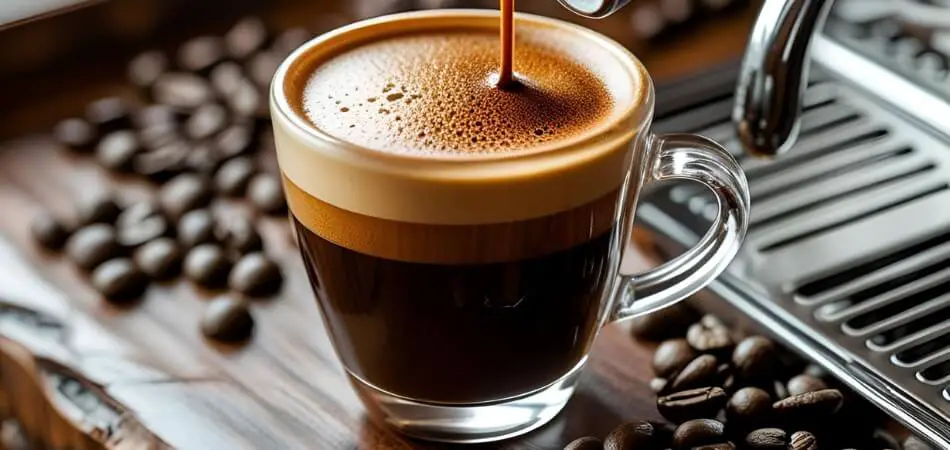Is Espresso Good for You?
Do you love that quick, intense buzz from an espresso shot but wonder, “Is espresso actually good for me?” You’re not alone. Espresso, the concentrated coffee beloved by caffeine enthusiasts, has a reputation for both supercharging productivity and causing jitters. But what does science say?
Espresso isn’t just a stronger coffee—it’s brewed differently, packed with antioxidants, and has unique health effects. Some studies suggest it can boost brain function, aid digestion, and even support heart health. But like anything, too much can lead to side effects like anxiety or sleep troubles.
In this article, we’ll break down:
✔ What makes espresso different from regular coffee?
✔ The science-backed benefits (and a few risks).
✔ Who should avoid it (or just cut back).
✔ How to enjoy espresso the healthiest way.
By the end, you’ll know exactly how to sip smarter. Let’s dive in!

What Is Espresso? How Does It Differ from Coffee?
Espresso isn’t just “strong coffee”—it’s a unique brewing method with distinct flavors, caffeine levels, and even health perks.
Key Differences Between Espresso & Drip Coffee
| Feature | Espresso | Regular Drip Coffee |
|---|---|---|
| Brewing Method | High-pressure (9 bars), 20-30 sec extraction | Slow drip, 4-6 min brew time |
| Caffeine per Ounce | ~63 mg (1 shot) | ~12-16 mg |
| Caffeine per Serving | ~63 mg (1 oz) | ~95 mg (8 oz cup) |
| Flavor & Texture | Bold, syrupy, with “crema” | Lighter, smoother |
| Antioxidant Levels | Higher (due to concentrated extraction) | Moderate |
Why Espresso’s Brewing Process Matters
Espresso is made by forcing hot water through finely-ground coffee beans at high pressure. This method:
- Extracts more oils and soluble compounds, giving it a richer taste.
- Preserves antioxidants better than slower brewing methods.
- Creates crema, the golden foam on top, which contains aromatic compounds.
Fun Fact: A single espresso shot has less total caffeine than a cup of drip coffee, but because it’s concentrated, it hits your system faster.
So, is espresso healthier? Let’s look at the science.

Nutritional Profile of Espresso
If you drink espresso black, it’s virtually calorie-free—but it packs a surprising nutrient punch.
What’s Inside a Shot of Espresso?
| Nutrient | Per 1 oz (30ml) Shot | Benefits |
|---|---|---|
| Caffeine | ~63 mg | Boosts alertness, focus |
| Antioxidants | High (polyphenols, chlorogenic acid) | Fights inflammation, supports heart health |
| Potassium | ~80 mg | Helps regulate blood pressure |
| Magnesium | ~8 mg | Supports muscle and nerve function |
| Niacin (B3) | ~0.5 mg | Aids metabolism |
Why Antioxidants Matter
Espresso is loaded with polyphenols, which:
✔ Combat oxidative stress (linked to aging and chronic diseases).
✔ May reduce the risk of Type 2 diabetes and certain cancers.
But beware: Adding sugar, cream, or syrups turns this healthy drink into a dessert. A caramel latte can have 200+ calories—negating espresso’s benefits!

Proven Health Benefits of Espresso
Now that we know what’s inside espresso, let’s explore how it actually affects your body—for better or worse.
A. Packed with Disease-Fighting Antioxidants
Espresso contains 2-3 times more antioxidants than regular drip coffee. These powerful compounds, like chlorogenic acid and polyphenols, help:
✔ Neutralize free radicals (unstable molecules that damage cells)
✔ Reduce inflammation (linked to heart disease, diabetes, and aging)
✔ May lower risk of chronic diseases, including liver disease and certain cancers
Did You Know? A 2022 study found that espresso drinkers had higher levels of antioxidants in their blood than non-coffee drinkers.
B. Boosts Brain Function & Mental Alertness
That quick mental clarity from espresso isn’t just in your head—it’s science!
- Caffeine blocks adenosine (a brain chemical that makes you tired)
- Increases dopamine and norepinephrine, improving mood and focus
- Enhances memory and reaction time (great before a workout or big meeting)
Bonus: Regular espresso consumption is linked to a lower risk of Alzheimer’s and Parkinson’s due to its neuroprotective effects.
C. May Improve Heart Health
Contrary to old myths, moderate espresso intake (1-2 shots/day) is heart-friendly:
✔ Improves blood vessel function (better circulation)
✔ Lowers risk of stroke by 20% in some studies
✔ Does NOT cause high blood pressure in most healthy people
Key Point: If you already have heart issues, check with your doctor—but for most, espresso in moderation is safe.
D. Supports Physical Performance
Many athletes swear by espresso before training. Here’s why:
- Spikes adrenaline, helping you push harder
- Breaks down fat for energy (great for endurance)
- Reduces perceived effort (workouts feel easier)
Pro Tip: Take your espresso shot 30-45 mins pre-workout for max effect.
E. Aids Digestion & Metabolism
That post-meal espresso in Italy? It’s tradition for good reason:
✔ Stimulates stomach acid, helping digestion
✔ Speeds up metabolism slightly (about 3-11%)
✔ May reduce appetite (helpful for weight management)
Warning: If you have acid reflux, espresso might aggravate it—opt for low-acid beans or cold brew instead.

Potential Downsides & Risks
Espresso isn’t for everyone. Let’s break down when it could cause problems.
A. Caffeine Sensitivity & Side Effects
- Jitters, anxiety, or rapid heartbeat (especially if you’re sensitive)
- Insomnia if consumed after 2 PM (caffeine’s half-life is 5 hours)
- Headaches or fatigue if you suddenly quit (withdrawal symptoms)
Fix: Try decaf espresso or limit to 1 shot if you’re caffeine-sensitive.
B. Digestive Issues
- Acidity can trigger heartburn or GERD
- Laxative effect (espresso stimulates bowel movements)
Solution: Drink with food, choose dark roasts (less acidic), or add a splash of milk.
C. Overconsumption Risks
- More than 4 shots/day may cause:
- Increased anxiety
- High blood pressure (in some people)
- Bone density concerns (if you don’t get enough calcium)
Safe Limit: Stick to 1-3 shots max per day.
D. Hidden Calories in Fancy Drinks
A plain espresso has almost zero calories, but popular drinks like:
- Caramel macchiato: 250+ calories
- White chocolate mocha: 400+ calories
Healthier Swap: Order an Americano (espresso + water) or add just a splash of milk.
Who Should Avoid or Limit Espresso?
While espresso is safe for most, some people should be cautious:
✅ Best For:
- Healthy adults needing a focus boost
- Athletes before training
- Those managing weight (if drunk black)
❌ Limit or Avoid If You Have:
- Anxiety disorders (caffeine can worsen symptoms)
- GERD or ulcers (acidity may irritate)
- Pregnancy (stick to <200mg caffeine/day)
- Heart conditions (check with your doctor first)
Pro Tip: If you’re unsure, try half-caff or switch to matcha for a gentler energy lift.

How to Enjoy Espresso Healthily
Want the benefits without the downsides? Follow these tips:
✔ Dose Right: 1-2 shots/day is ideal for most.
✔ Time It Well: Drink before noon to avoid sleep issues.
✔ Skip the Sugar: Use cinnamon or cocoa powder for flavor instead.
✔ Pair with Water: Prevent dehydration by sipping H2O too.
✔ Listen to Your Body: If you feel jittery, cut back.
My Favorite Healthy Espresso Drink:
“Espresso Romano” – A shot with a lemon twist (cuts bitterness and boosts vitamin C!).
Conclusion: Should You Drink Espresso?
The verdict? Yes, espresso can be healthy—if consumed wisely. Its antioxidants, brain benefits, and metabolism boost make it a smart choice for many. But overdo it, and you’ll face jitters, sleep troubles, or digestive woes.
Final Tip: Enjoy your espresso black or with minimal additions, keep it to 1-3 shots, and time it early in the day.
Now I’d love to hear from you!
👉 Do you prefer espresso or coffee? What’s your favorite way to drink it?
FAQ’s
Is espresso healthier for you than coffee?
Espresso is more concentrated in antioxidants and caffeine per ounce than drip coffee, but its health benefits are similar since both come from coffee beans. The main difference is portion size and brewing method—choose based on preference!
Is a shot of espresso a day healthy?
A daily shot of espresso can be healthy—packed with antioxidants and linked to improved focus—but moderation is key, as excess caffeine may cause jitters or sleep issues. Most health experts recommend 1-2 shots max per day.
What does espresso do to your body?
Espresso boosts energy and focus by rapidly delivering caffeine (63mg per shot) while providing antioxidants. Excess intake may cause jitters, insomnia, or increased heart rate in sensitive individuals.
What are the disadvantages of espresso?
Espresso’s high caffeine content may cause jitters, insomnia, or increased heart rate, while its acidity can trigger digestive issues or tooth enamel erosion in some people.






